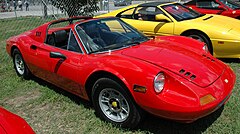Ferrari Dino

| |
| Ferrari Dino | |
|---|---|
| Manufacturer: | Ferrari |
| Class: | mid-engined sports car |
| Production: | 1968 — 1973 3,913 produced |
| Predecessor: | Fiat Dino |
| Successor: | Ferrari 308 GTB |
| Dino 206 | |
| Production: | 1968 — 1969 |
| Body Styles: | Berlinetta |
| Engines: | 2.0 L V6 |
| Dino 246 | |
| Production: | 1969 — 1973 |
| Body Styles: | Berlinetta |
| Engines: | 2.4 L V6 |
The Dino was a brand for mid-engined, rear-drive sports cars produced by Ferrari from 1968 to 1976. The Dino name was retired by 1976, though the cars remained in production. It was created as an attempt to produce a relatively low cost vehicle by using components from more common vehicles, in much the same way that Porsche did with the 914.
The Dino was the first Ferrari model produced in high numbers: Just under 4,000 V6 Dinos were built in five years. Although not universally embraced, the V6 Dinos are lauded by many for their intrinsic driving qualities and groundbreaking design. In 2004, Sports Car International named this car number six on the list of Top Sports Cars of the 1970s. Motor Trend Classic named the 206/246 as number seven in their list of the 10 "Greatest Ferraris of all time".
The Dino
The name "Dino" honors the founder's late son, Alfredino "Dino" Ferrari, who was responsible for the creation of the V6 engine. Along with famed engineer, Aurelio Lampredi, Dino prodded Enzo Ferrari to produce a line of racing cars in the 1950s, with V6 and V8 engine designs.
In 1967, after Dino's death, Ferrari wished to race in the 1.6 L class of the Formula 2 racing series with Dino's V6. However, the company could not meet the homologation rules which called for 500 production vehicles using the engine. Enzo Ferrari asked Fiat to co-produce a sports car using the engine, and the front-engined, rear-drive Fiat Dino was born. It used a 2.0 L (1987 cc) version of the Dino V6, allowing Ferrari to enter the series.
Another controversy at the time was the use of a mid-engine layout in a production car. Lamborghini's Miura created a stir with the low front bodywork that this design enabled, but Enzo Ferrari felt that a mid-engine Ferrari would be unsafe in the hands of his customers. He relented and allowed designer Sergio Pininfarina to build a mid-engined concept for the 1965 Paris Motor Show, but demanded that it wear the Dino name alone. Response to the radically-styled car was tremendous, so Ferrari allowed it to go into production, rationalizing that the low-power V6 engine would keep his customers out of trouble.
Many people only think of the V6 cars when using the "Dino" name. Later V8 models, including the 308 GT4 and 308 GTB, were also sold under the Dino marque, but these are sometimes not considered to be members of the Dino family. Both V8 models were given the "Ferrari" name after a short time.
Dino 206
The production Dino 206 was an excellent sports car with a beautiful Pininfarina body. Some consider this one of the most stylish of Ferrari rear engine automobiles. It has the soft edges and curving lines typical of earlier Italian cars, unlike the later performance cars from Ferrari such as the Bertone-designed 308 GT4 which has the straighter lines and crisp edges seen most boldly in Bertone's Fiat X1/9.
The 206 used a transverse-mounted 2.0 L all-aluminum V6 engine. With the light-weight mid-engine body, an 8000 rpm redline, full independent suspension, and all disc brakes, the 206 driving experience was a quantum leap from previous Ferrari sports models.
Dino 246
Calls for more power were answered with the 2.4 L (2418 cc) Dino 246. It used an iron version of the engine with 195 hp and was available as a fixed-top GT coupe or, after 1971, an open targa GTS.
Dino 308 GT4
The angular or "wedge-shaped" Bertone-styled 2+2 308 GT4 also wore the Dino badge. This model is covered in more detail on the Ferrari GT4 page.
